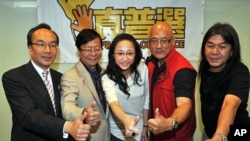Although democracy advocates in Hong Kong have taken 80 percent of the vote in by-elections, there are questions about the significance of their victory because of low voter turnout.
Five democracy activists easily re-captured their seats in an election triggered by their resignation in January from the city's legislature.
Their resignations, coordinated by the Civic Party and League of Social Democrats, were to protest the city's slow progress toward universal suffrage.
Civic Party leader Audrey Eu explains:
"For 20 years we have been fighting for universal suffrage. But we have a very unique and antiquated system in Hong Kong, which is called functional constituencies," Eu Said. "I understand it is (an idea) taken from the Mussolini days. Real universal suffrage means that you have at least to commit to the abolition of functional constituencies."
Half the 60-seat Hong Kong legislature is directly elected. Thirty functional constituencies are reserved for professional interest groups that broadly are pro-Beijing.
Hong Kong, a former British colony, returned to Chinese rule in 1997. It retains civil liberties not found in the rest of the country, including a free press and freedom of religion. But there has been no progress on promises of increased democracy in the city since the transfer of sovereignty.
Democracy advocates initially touted the campaign to re-elect the five democrats as a de-facto referendum on universal suffrage and the abolition of the functional constituencies.
That the candidates reclaimed their seats with 80 percent of the vote comes as no surprise. Just before the legislators resigned, mainland officials warned the referendum idea represented a challenge to China's authority. As a result, pro-Beijing parties refused to nominate any candidates, effectively de-railing the election as a contest.
"Of course, before the pro-establishment forces were given instructions by Beijing not to take part, we were hoping for a real contest and to push the voter turnout rate over 50 percent," Eu adds.
Even without opponents, democrats hoped that high voter turnout would constitute an endorsement of their reform demands.
But at only 17 percent, the turnout was the lowest since 1997. The Hong Kong secretary for constitutional and mainland affairs, Stephen Lam, said the vote showed Hong Kong people want to proceed with the government's 2012 constitutional reform plan.
Hong Kong's Beijing-backed chief executive, Donald Tsang, announced that package in April. Subject to legislative approval, it would allow for more directly elected lawmakers in 2012, more functional constituencies, and the enlargement of the committee that elects the chief executive.
Hong Kong Democrats Win Bittersweet Election Victory




